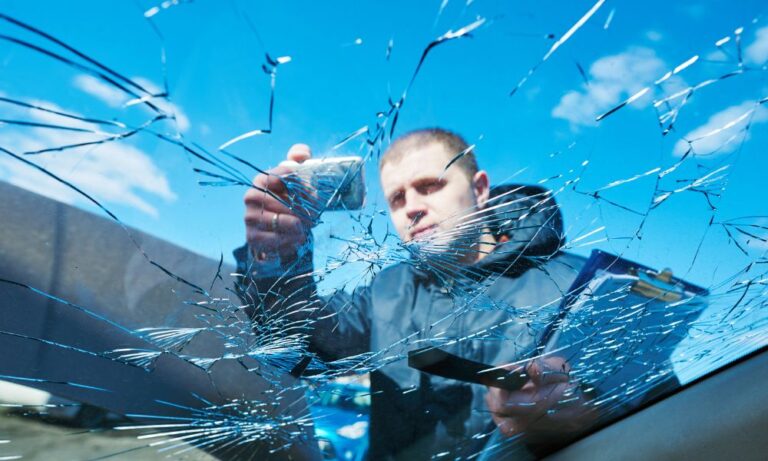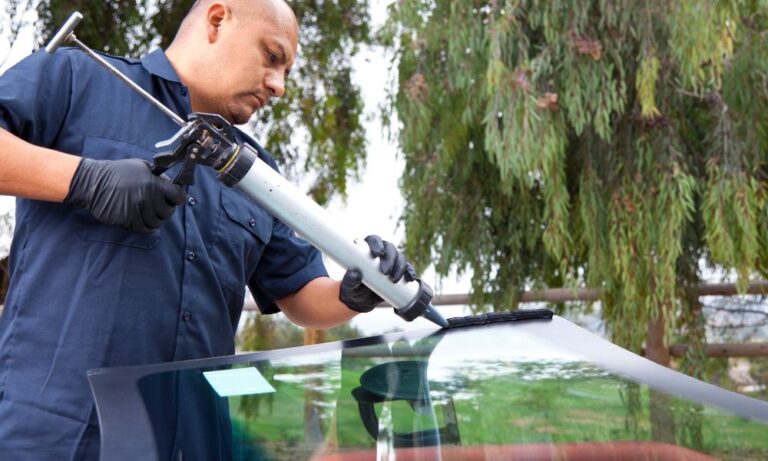In this blog post, we will delve deeper into the...
Does Insurance Cover Windshield Damage? Explained

When it comes to driving, one of the most common issues that car owners face is windshield damage. From small chips caused by flying debris to significant cracks from accidents, windshield damage is an unfortunate reality.
One of the primary concerns for drivers is whether their insurance will cover the costs of repair or replacement. In this blog, let us understand the intricacies of auto insurance and windshield damage, and what to expect when you encounter this issue.
Types of Auto Insurance
Before we discuss windshield coverage, it’s essential to understand the different types of auto insurance available:
Liability Insurance:
This is the most basic form of auto insurance and is mandatory in most states. It covers bodily injury and property damage to others if you are at fault in an accident. However, it does not cover damage to your own vehicle, including the windshield.
Collision Insurance:
This type of insurance covers damage to your vehicle resulting from a collision with another car or object. While it does cover windshield damage if it’s caused by an accident, it often comes with a deductible.
Comprehensive Insurance:
Comprehensive insurance covers damage to your vehicle that is not the result of a collision. This includes theft, vandalism, natural disasters, and yes, windshield damage caused by things like falling tree branches or road debris.
Full Glass Coverage:
Some insurance companies offer an optional add-on known as full glass coverage. This coverage specifically addresses glass damage, including windshields, and typically does not require a deductible.
Factors Affecting Windshield Coverage
Whether or not your insurance covers windshield damage depends on several factors:
Type of Insurance:
As mentioned, comprehensive insurance and full glass coverage are more likely to cover windshield damage. Liability insurance will not cover it, and collision insurance only covers it if the damage is due to an accident.
Deductibles:
A deductible is the amount you must pay out of pocket before your insurance kicks in. For example, if your comprehensive insurance has a $500 deductible and your windshield repair costs $300, you will have to cover the repair costs yourself. Some policies, especially those with full glass coverage, may waive the deductible for windshield repairs.
State Laws:
Insurance regulations vary by state. Some states, like Florida, South Carolina, and Kentucky, require insurance companies to offer zero-deductible windshield repair or replacement under comprehensive coverage.
Extent of Damage:
Insurance companies may distinguish between minor chips and cracks that can be repaired and more extensive damage that requires a full windshield replacement. Policies might cover repairs without a deductible but require one for replacements.
Filing a Claim for Windshield Damage
Steps to Take
If you discover windshield damage and want to file a claim, here are the steps to follow:
- Assess the Damage: Determine whether the damage is a small chip or a large crack. Minor damage can often be repaired, while significant cracks usually require replacement.
- Check Your Policy: Review your insurance policy to understand your coverage and deductible. Look for specifics about comprehensive coverage or full glass coverage.
- Contact Your Insurance Company: Notify your insurer about the damage. Many insurance companies have a streamlined process for glass claims and may even have preferred repair shops.
- Get an Estimate: Some insurance companies will require you to get an estimate from an approved repair shop. They may also send an adjuster to inspect the damage.
- Schedule Repairs: Once your claim is approved, schedule the repair or replacement. Many auto glass repair companies offer mobile services, allowing them to fix your windshield at your home or workplace.
Choosing a Repair Shop
When selecting a repair shop, consider the following:
- Insurance Approval: Ensure the shop is approved by your insurance company. This can simplify the claims process and ensure direct billing.
- Reputation: Look for a shop with positive reviews and a good reputation for quality work. GlassFixit, for example, is a trusted name in Santa Clara County for auto glass repair and replacement.
- Warranty: Check if the shop offers a warranty on their work. A good warranty can provide peace of mind and ensure that you are covered if any issues arise after the repair.
Preventing Windshield Damage
While insurance can cover the cost of repairs or replacements, preventing damage in the first place is always preferable. Here are some tips to help you protect your windshield:
- Maintain a Safe Following Distance: Avoid tailgating to reduce the risk of rocks and debris being kicked up by the vehicle in front of you.
- Avoid Construction Zones: Construction areas are often filled with loose gravel and debris. If possible, take an alternate route.
- Park in Safe Areas: Whenever possible, park your car in a garage or under a carport to protect it from falling branches and other hazards.
- Repair Chips Immediately: Small chips can quickly turn into large cracks if not addressed promptly. Repairing minor damage early can prevent the need for a full replacement.
Conclusion
In conclusion, whether insurance covers windshield damage depends on your specific policy and the circumstances of the damage. Comprehensive insurance and full glass coverage are your best bets for ensuring that windshield repairs or replacements are covered. Understanding your coverage, knowing how to file a claim, and taking preventive measures can save you time, money, and hassle in the long run.
At GlassFixit, we specialize in auto glass repair and replacement, offering top-notch services to residents of Santa Clara County. If you find yourself dealing with windshield damage, don’t hesitate to reach out to us. Our experienced technicians are here to help you get back on the road safely and quickly.
Popular Searches
Audi Windshield Replacement in Santa Clara County
Auto Car Window Tinting in Santa Clara County
Auto Glass Repair and Replacement in Santa Clara County
Auto Glass Repair in Santa Clara County
BMW Windshield Chip Repair in Santa Clara County
BMW Windshield Repair and Replacement Services in Santa Clara County
Car Window Repair in santa clara
Car Window Repair in Santa Clara County
Commercial truck windshield replacement
Dodge Windshield Repair and Replacement Services in Santa Clara County
Dodge Windshield Replacement in Santa Clara County
Glass repairs for cars near me
Honda pilot windshield replacement cost
Honda Windshield Repair and Replacement Services in Santa Clara County
Honda Windshield Replacement in Santa Clara County
Hyundai Tucson windshield replacement
Hyundai Windshield Repair and Replacement Services in Santa Clara County
Hyundai Windshield Replacement in Santa Clara County
Jeep Windshield Repair and Replacement Services in Santa Clara County
Jeep Wrangler Windshield Replacement in Santa Clara County
Kia Windshield Repair and Replacement Services in Santa Clara County
Kia Windshield Replacement in Santa Clara County
Mobile Auto Glass in Santa Clara County
Mobile Auto Glass Repair in Santa Clara County
Mobile glass replacement near me
Same day windshield repair near me
Toyota Camry side mirror glass replacement
Windshield Calibration in Santa Clara County
Windshield Chip Repair in Santa Clara County
Windshield chip repair near me
Windshield Repair and Replacement Services in Santa Clara County
Windshield Repair and Replacement Services Near Me
Windshield Repair in Santa Clara County
Windshield repair service near me
Windshield Replacement Near Me
Windshield Replacement Services in Santa Clara County
Read more Articles
Auto Glass Care in Extreme Weather Conditions: Snow, Heat, and Rain
In this blog post, we will delve deeper into the...
The Environmental Impact of Auto Glass: Recycling and Sustainability Efforts
In this blog post, we will delve deeper into the...



